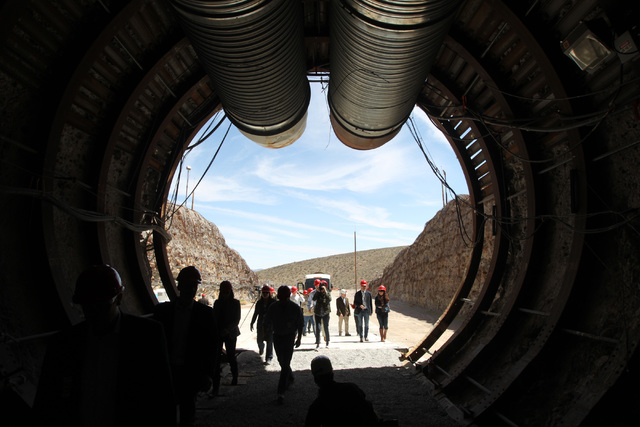Congress likely to seek funding for Yucca Mountain nuclear waste project, state report says

The Nevada commission charged with overseeing nuclear waste issues on Tuesday warned that it expects Congress to seek funding to revive the shuttered Yucca Mountain repository project this year.
The warning is contained in a report to Gov. Brian Sandoval and the state Legislature from the Nuclear Projects Commission. The report states it is not yet clear whether the Trump administration would support reviving the shuttered program to permanently store 77,000 tons of high-level radioactive waste — primarily spent fuel from commercial power reactors — in a maze of tunnels inside the Nye County mountain.
The 35-page report, which was approved in a telephone conference by the commission, notes that the Yucca Mountain project faces many hurdles before it could be granted a license by the U.S. Nuclear Regulatory Commission. It notes that Nevada still has 218 “contentions” challenging the science of the repository plan before the NRC’s licensing panel that have been in limbo since the Obama administration defunded the project in 2011.
And Bob Halstead, executive director of the Nevada Agency for Nuclear Projects, which prepared the reports approved by the seven-member commission led by former U.S. Sen. Richard Bryan, D-Nev., said the state also would file “up to 50 new ones we’re developing.”
The state’s contentions challenge the plan on a range of issues, including arguments that the overall design of the planned repository is flawed and that there is a potential for renewed volcanic activity near the site, roughly 100 miles northwest of Las Vegas. Those objections were still on the table when the project was mothballed.
Halstead also said it should become clear in the next few months whether Congress will seek funds to revive the process, which is opposed by top state officials from both parties.
“We expect certainly by the middle of April we’d have a sense of what’s going to happen with possible funding for DOE and NRC licensing restart of Yucca Mountain,” he said.
Based on past estimates, completing the licensing process could cost $2 billion or more. The NRC chairman has set the task’s cost at $330 million over multiple years.
The Trump administration’s stance on reviving the project remains unclear, the report noted.
During his nomination hearing this month, President Donald Trump’s pick to head the Department of Energy, former Texas Gov. Rick Perry, left open the possibility that the nation’s highly radioactive waste could be entombed there, though he did not say he supported reviving the project.
The report provided support for the state’s position that interim storage of the waste could be handled in Texas or New Mexico by willing applicants for temporary storage facilities, buying more time to devise a permanent storage solution.
“NRC has received a license application for an interim storage facility that would be located in Andrews County, Texas,” it said. “Another entity has notified NRC that it intends to submit an application for a similar facility in Eddy and Lea Counties, New Mexico. These proposed facilities would store spent nuclear fuel from commercial nuclear power plants for 40 years or more in dry storage systems similar to, and in some cases the same as, those being used for storage at reactor sites.”
The report also recommends that in the likely event that Congress appropriates new funds for the project, Sandoval and the Nuclear Projects Agency “should develop plans for a major public information program on the radiological and social impacts of transporting spent nuclear fuel and high-level radioactive waste” across the nation to Yucca Mountain.
Contact Keith Rogers at krogers@reviewjournal.com or 702-383-0308. Follow @KeithRogers2 on Twitter.